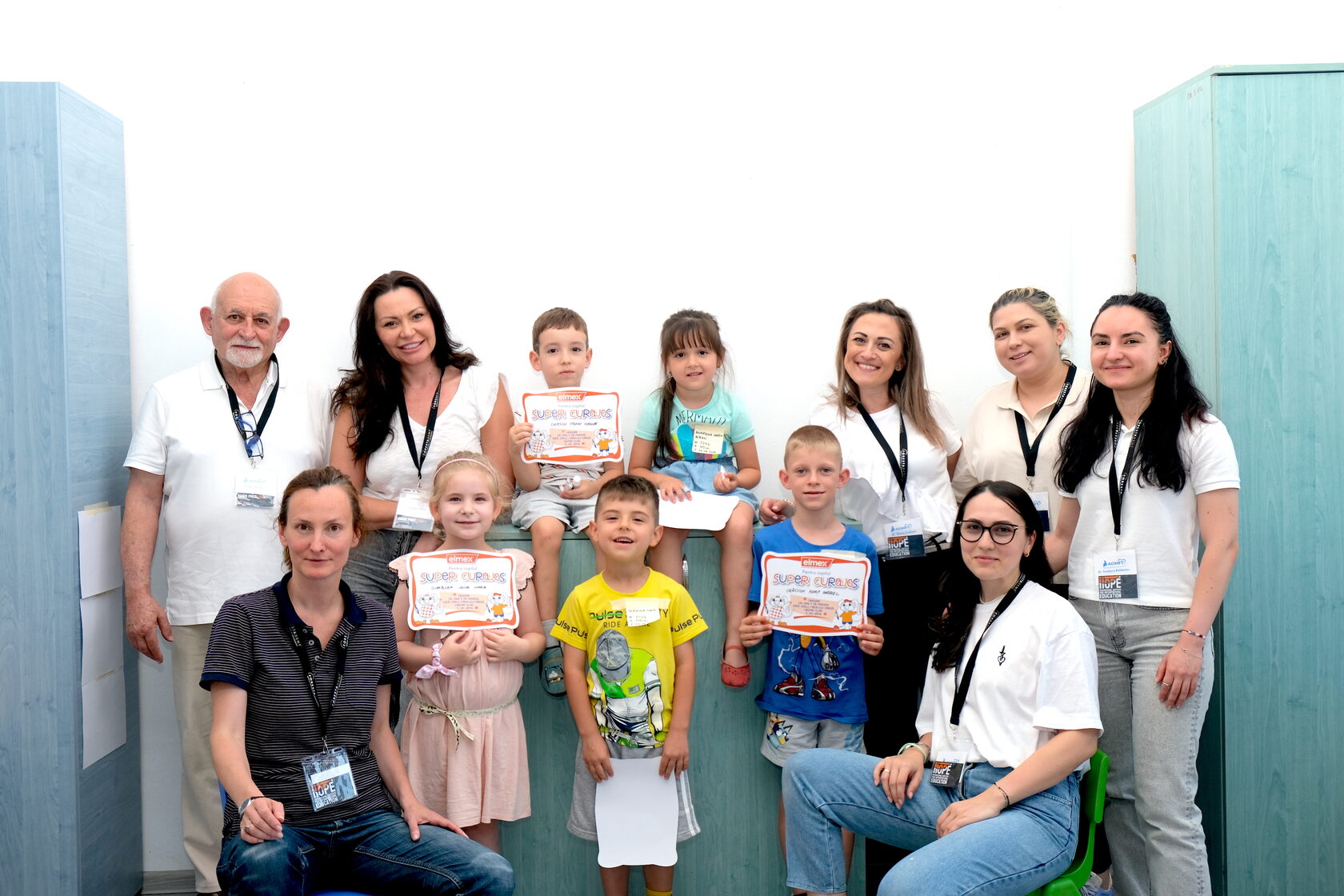For the Health of Future Generations


We're thrilled to announce the start of the HFG Project in July 2024. The project was launched in Constanta, Romania. We're grateful to have the support of the Consul of Preschool Education of the Constanta District.
we launched!
We selected 65 children, aged 6 to 6.5, from three kindergartens at different social levels to be in the control group. The first medical assessments showed that 80% of the children had breathing and functional issues, which made it really clear that this intervention was needed urgently.
The programme was officially launched by IIOPE's CEO, Roger Price, and COO, Valentina Gecha. We'd like to thank our Romanian team, made up of Ilia Jipa, Elena Crăciun, Ramona Constantin, Iulia-Alexandra Tașcău, Teodora Boldeanu, Carolina Fischer, Catalina Lancu, and Simona Giurca, for all their hard work and commitment to excellence.

For the Health of Future Generations is a Primary Prevention Education Program for preschools
The neo-preschool concept, called the Primary Prevention Education Program, aims to expand early education to include lessons on oral health, self-care, habit awareness, and functional behavior. The plan involves teaching and motivating adults to live healthy lifestyles and incorporating health-related social factors into the training of teachers and caregivers.
This comprehensive approach is designed to help children develop healthy habits and behaviours that will benefit them throughout their lives.
The project is comprised of two sub-objectives, namely educational and research.
The project is comprised of two sub-objectives, namely educational and research.
Implementation
Ensuring every child’s right to optimal health by creating
a healthy environment
a healthy environment
SOLUTION
The majority of preschools globally are currently focusing their attention on:
- Reading and Writing
- Math
- Science and Social Studies
- Extracurricular Activities (Art, Music, Drama, Sport)
- Oral hygiene and age appropriate self-care
- Hydration and nutrition
- Behavioural habits (thumb sucking, nail biting, cuticle picking)
- Chewing, swallowing and orofacial development
- Posture and head position
- Breathing day/night
- Sleep
HFG project aims to expand the focus with programs in self-care, habit awarenesses and functional behaviour:
60–90% of school children worldwide suffered from caries and more then 70% have occlusion problems.
Respiratory dysfunction can result in prolonged oxygen deprivation to body tissues, including the brain, impacting a child's academic and social life.
Bacterial colonies found on the adenoid surfaces of children suffering from recurrent upper-airway inflammation and abstructive sleep apnea mostly consist of oral microflora.
global problem
PRIMARY PREVENTION EDUCATION PROGRAM
To implement oral health promotion programs in pre-schools, as proposed by the WHO and other health intervention organisations. These programs provide important support networks for families and communities.
Improve Oral Health
Kindergarten-based programs can also help increase children's awareness and subsequent compliance with oral health procedures.
Health-related beliefs, behaviours, and attitudes are typically formed during early childhood. Kindergartens offer an ideal opportunity to establish and reinforce these behaviours.
nurture behaviour for a lifetime
Hygiene lessons for children and adults
Daily oral care (brushing teeth)
Learning games for concentration
Active games to strengthen muscles and improve posture
Improving the quality of sleep
Regular check-ups by specialists
children's commitment to self-care
program activities to implement kindergarten's routine
Creative activities to develop motor skills, functional breathing, articulation and speech
Apply now to start the HFG program in your preschool
research
To provide global scientific evidence for the effectiveness of implementing preventive healthcare strategies in preschools at the state level worldwide.
4,000 children
Engaged in the educational programme, underscoring its broad influence and reach.
10 countries
Demonstrating the global reach of the programme, spanning diverse national and cultural backgrounds.
7 continents
Highlighting the universal applicability of early health education, regardless of climate or regional differences.
3.5 years
Emphasizing the significant period during which foundational health and well-being habits are formed in early childhood education settings.
The primary goal of the study is to provide the World Ministry of Health with a prevention model for non-communicable diseases that relies on health determinant principles and is supported by statistical evidence from comprehensive research studies. Our main hypothesis posits that the preschool years are critical for establishing lifelong, sustainable health behaviour beliefs, and attitudes.
By fostering a health-promoting environment during this formative period, we can facilitate sustainable development and long-term well-being. The next step in our research is to provide global scientific evidence for the effectiveness of implementing preventive healthcare strategies in neo-preschools at the state level worldwide.
Baseline Measurements
Measurements: height, weight.
Child's ID card: Trainers fill in date of birth, name, and anthropometric parameters.
Child's ID card: Trainers fill in date of birth, name, and anthropometric parameters.
Posture Analysis
Postural assessment entails observation of static posture for alignment and visual and palpable assessment of paired anatomic landmarks for symmetry.
Output data: Four images focusing on head, shoulders, neck, eyes, ears, ribcage, pelvis, knees, and feet.
Output data: Four images focusing on head, shoulders, neck, eyes, ears, ribcage, pelvis, knees, and feet.
Oral and Dental Health Assessment
It is crucial for identifying any developmental delays, functional impairments, or abnormalities in a child's oral and dental health.
Focus Areas: Hygiene, primary and mixed dentition, nasal potency and congestion, tongue function, tethered oral tissues.
Output data: Intraoral photos and videos showing occlusion.
Focus Areas: Hygiene, primary and mixed dentition, nasal potency and congestion, tongue function, tethered oral tissues.
Output data: Intraoral photos and videos showing occlusion.
Capnometry
A non-invasive method that measures the ETCO₂ (end-tidal carbon dioxide pressure) in exhaled air and Respiratory Rate providing a clear indication of functional pH and balanced biochemistry.
Measurements: Baseline resting end-tidal CO₂ and Respiratory Rate.
Comparisons: Readings when supine and with thorax expansion.
Measurements: Baseline resting end-tidal CO₂ and Respiratory Rate.
Comparisons: Readings when supine and with thorax expansion.
key research criteria
Multidisciplinary approach encompasses a range of knowledge and skills related to body function and balance, sensory integration, orofacial functions, speech and articulation, functional breathing, behavior (including sleep, emotions, and stress management), and nutrition.
General Functional Assessment
Important for assessing a child’s overall physical and oral abilities, it helps to identify any developmental delays, primitive reflex release or functional impairments, and provides a comprehensive understanding of the child’s motor skills and coordination, essential for effective intervention and support.
Activities: sitting, standing, walking in place, single leg proprioception (eyes open and closed), running, gait recording, jumping, ball throwing, catching and kicking.
Oral Functions: Chewing, Swallowing, Articulation.
Activities: sitting, standing, walking in place, single leg proprioception (eyes open and closed), running, gait recording, jumping, ball throwing, catching and kicking.
Oral Functions: Chewing, Swallowing, Articulation.

Spot It Early. Shape Their Future.


Children suffer from:
• Compromised breathing
• Poor sleep quality
• Crooked teeth
• Dental caries
• Speech problems
• Compromised breathing
• Poor sleep quality
• Crooked teeth
• Dental caries
• Speech problems
We believe that physical and emotional balance can become a reality through education, particularly for children.
The projects are designed to cover all stages of childhood, allowing children to be educated and supported in a systematic and holistic way.
The projects are designed to cover all stages of childhood, allowing children to be educated and supported in a systematic and holistic way.
Faces and Lives
We increase children's awareness and subsequent compliance with oral health procedures
We form health-related beliefs, behaviours, and attitude during early childhood
We educate teachers and parents to provide a suitable environment
We form health-related beliefs, behaviours, and attitude during early childhood
We educate teachers and parents to provide a suitable environment

By clicking the button "Donate!" you agree with our Donation Policy and Privacy Statement
This will include medical staff and caregiver education, preschool equipment, data collection, and media support.

